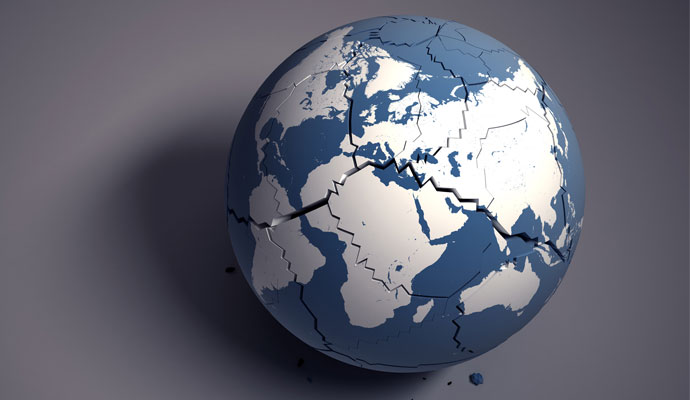For Indian Companies, It’s Globalization as Usual
Nirmalya Kumar, a professor of marketing at the London Business School, argues in a new book that although the world economic crisis may have taken the bite out of some Indian companies, most will adapt and emerge globally.
(originally published by Booz & Company)The global economic crisis has slowed India’s growth, but it has not curbed the potential of its strongest homegrown companies. So says Nirmalya Kumar, coauthor of India’s Global Powerhouses: How They Are Taking On the World (with Pradipta K. Mohapatra and Suj Chandrasekhar; Harvard Business School Press, 2009). Kumar believes that many of India’s largest companies are poised to expand into international markets and become true multinationals. Concerns have been raised about India’s accounting standards following the scandal at Satyam Computer Services Limited, a well-respected outsourcing outfit whose founder admitted to inflating the company’s financial statements by upward of US$1 billion. Yet even that blemish, says Kumar, will ultimately benefit ambitious Indian companies as they seek to improve corporate governance. In April, strategy+business spoke with Kumar about the future of Indian companies and their place in the global economy.
S+B: Are Indian multinationals reining in their growth strategies?
KUMAR: In general, the global strategies of many Indian companies are based on liquidity, which allows them to make acquisitions. Companies that have been hurt by the crisis will slow down their efforts to expand through acquisition. But companies with strong balance sheets and cash positions will continue to go global. In fact, Indian companies have made several cash acquisitions recently, including Sterlite Industries’ billion-dollar-plus purchase of copper mines from Tucson, Ariz.–based ASARCO LLC, and Tata Consultancy Services’ $500 million acquisition of Citigroup Global Services.
S+B: With Accenture, IBM, and Hewlett-Packard’s EDS unit launching counterattacks against India’s information technology outsourcing businesses, such as Wipro, Infosys, and Satyam, how will Indian technology firms fare?
KUMAR: The U.S. companies have the front-end capability to conduct computer activities directly at customers’ locations. What they don’t have is back-office efficiency; they are less cost-effective and less capable in general of performing tasks that can be done remotely. By increasing the number of people they employ in India, they’re rushing to mimic the back offices of Indian outsourcers. Conversely, Tata, Wipro, and Infosys are making small acquisitions abroad to obtain the same front-end capabilities that IBM has. In the past five years, for example, Wipro has acquired Infocrossing in the United States and several smaller technology consulting firms in Canada, Germany, Finland, and Portugal. In other words, both Western and Indian companies are rushing for the same spot, coming at it with different strengths. Both will win. I don’t think it’s a question of either-or. Of course, as a result of what happened at Satyam, the reputation of Indian outsourcers has been hurt, so Indian companies now have to prove that they have effective corporate governance.
S+B: Tata Group has finally launched the Nano, its $3,000 minicar, in India. But how long will it take for it to market that car or a similarly inexpensive one in world markets?
KUMAR: For the moment, the Nano has been designed for the Indian market — its safety equipment, or lack thereof, would not meet U.S. or European standards — and the potential Indian market is so large that it makes no sense for Tata to take the Nano into global markets anytime soon. Tata, which represents almost 5 percent of India’s exports and 2.5 percent of India’s GDP, has been global for the past 10 years in many businesses, including steel, hotels, tea, and chemicals. More than 60 percent of the group’s revenues come from outside India. So it knows how to manage global companies. But the automotive industry is under tremendous stress right now. Developing new cars for the wider world market is challenging for Tata not because it lacks the global management strength or the global capability, but because the auto sector has collapsed worldwide. Even if you have the world’s greatest management strengths, there’s not a lot you can do about this depressed market. For that reason, last year’s [$2.3 billion] acquisition of Jaguar and Land Rover from Ford, which was going to be challenging in the best of times, is currently causing Tata considerable stress.
S+B: Two of the largest Indian multinationals, Arcelor Mittal and Dr. Reddy’s, have had subpar results recently. How does their lackluster performance jibe with your argument that India’s multinationals are going to fare reasonably well and even grow during this downturn?
KUMAR: Each Indian multinational is different and will have its own strategic opportunities and challenges. Mittal is going to do fine in the long run but may be limited in its ability to expand in the short run. As a steelmaker, because of the collapse in the global construction and automotive sectors, it is facing the same challenges that all the other companies in its industry face. Reddy’s is in a totally different industry — pharmaceuticals; it is one of the leading generic drug producers in India. And in 2006, in the company’s largest international acquisition, Reddy’s acquired Betapharm, the fourth-largest German pharmaceutical company. Reddy’s is facing challenges integrating the acquisition because the business model in Germany is different from India’s. The German health-care structure is different, its patent protections are stronger, and the environment is highly regulated; it will take time, perhaps, but Reddy’s still has to learn how to make this acquisition work and yield value.
S+B: Traditionally, Indian companies are run by dominant families. With this model, can they match the management skills of Western multinationals?
KUMAR: They have to professionalize and improve their governance, and they are doing that. But just because you have a family business doesn’t mean it can’t be professional. You have some family-run businesses that have very strong governance standards, whereas in other family businesses the board of directors meets around the dinner table. The good family businesses — such as Aditya Birla Group and Mahindra & Mahindra — retain professional managers and employ better financial standards. But you don’t even hear about some of the family companies that were strong 20 years ago. They’ve become shadows of their former selves. They couldn’t professionalize and compete in the new environment.
The winners among these family businesses have also communicated better with stakeholders outside the company, especially with shareholder financial institutions. That has helped them raise more capital on India’s stock exchanges and get better financing from the banks. Ultimately what I think you’re going to see is that the Indian companies that have gone global will have the operations and systems and processes that any Western multinational has. But, similar to what has occurred in the West, I don’t think the families will completely sever their involvement with these companies. Ford Motor Company is a family business, and so are Bertelsmann in Germany and L’Oréal in France. ![]()
William J. Holstein is the author of Why GM Matters: Inside the Race to Transform an American Icon (Walker, 2009). For more on his work, see www.williamjholstein.com.



